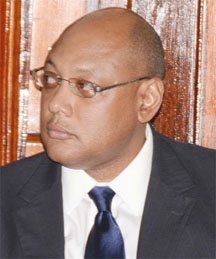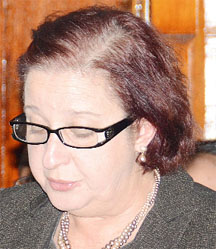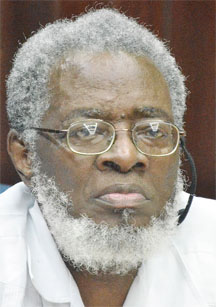-cites concerns about presidential assent to bills
Speaker of the National Assembly Raphael Trotman yesterday warned the Office of the President (OP) against provoking a constitutional crisis and argued that should President Donald Ramotar, without good reason, not assent to bills passed by Parliament “he can be considered to be in gross dereliction of his constitutional duty.”
The strong language yesterday from Trotman was a further sign of tension between the two branches of government and came in reply to Head of the Presidential Secretariat Dr Roger Luncheon, who on Thursday restated the government’s position that bills passed via the opposition’s one-seat majority may not achieve the presidential assent necessary for them to become law.
Trotman’s statement also addressed concerns raised by PPP/C Chief Whip Gail Teixeira about the agenda for Monday’s sitting of the National Assembly–the first since the parliamentary recess ended.
Trotman deflected the government’s charge that he should not have allowed a number of opposition-piloted Bills on the Order Paper by arguing that that was a matter solely in the purview of the Clerk of the National Assembly.
Government’s contention, as expressed in a letter to the Speaker, is that some of those Bills are in breach of the Standing Orders.

Teixeira, in a letter to Trotman on Thursday, said that the President’s Benefits and Other Facilities (Amendment) Bill 2012 appears to be in violation of Standing Order 26, which states that matters brought before the House shall not relate to matters which have been referred to a Committee in the National Assembly for consideration and report. The matter of the President’s benefits and other facilities is the subject of a special select committee as a result of a motion passed prior to the adjournment of the House in August, calling for a review of those benefits and other facilities.
“The government wishes to be advised if by seeking permission to table this bill that the said mover of Resolution No.22 which resolved to establish a parliamentary special select committee is by doing so negating and overtaking the role and work of that committee,” Teixeira inquired in the letter.
With regard to APNU MP Carl Greenidge’s Fiscal Management and Accountability (Amendment) Bill 2012, to be tabled on Monday, Teixeira said that Section 82 of the principal Act says that the Minister may, by Order, amend the Schedule. “There is in fact no provision for the amendment of the Schedule by any act of the National Assembly,” Teixeira said.
“Furthermore, the most recent amendment to this Schedule was by Order No. 20 of 2012 by the Minister of Finance on March 31, 2012 where ‘The Office of the Auditor General’ was removed and corrections made to the nomenclature of a number of Ministries after the November 28, 2011 elections. This Order follows and brings the FMAA Act in consonance with Article 222 A and the Third Schedule of the Guyana Constitution. The FMAA Act therefore follows and provides in several sections for matters in the Guyana Constitution with regards to financial matters and government accountability,” she said.

She also reminding that in the discussion between APNU and government during the budget debate, the government’s response to the proposed changes by the APNU to include new entities to the Third Schedule of Article 222A in the Constitution was that it would require constitutional change and therefore it should be raised in the new Parliamentary Committee on Constitution Reform. This point was reiterated during the debate on Greenidge’s motion on the same issue, she added.
“Thus Mr. Greenidge’s move to now bring a bill to amend the Schedule of the FMAA Act is premature as these entities are not provided for in the Constitution’s Third Schedule and will therefore be outside of these parameters and basically be in ‘no-man’s land’, so to speak,” said Teixeira.
Cabinet Decision
Teixeira said too that there must be a Cabinet Decision for the amendment of any Act, which will lead to an increase of the payment, issue or withdrawal of funds under the Consolidated Fund, thereby prohibiting the National Assembly from doing so.
She also objected to the inclusion on the Order Paper of two Bills similar in nature to two that had been tabled by government before the recess began, namely the Public Utilities Bill and the Telecommunications Bill. The Government’s PUC and Telecommunications Bills were read for the first time on August 9, 2012 and are listed for second reading at the October 22, 2012 sitting. “Therefore the Government is seeking clarification from you as to whether you will allow two Opposition bills which are on the same matters and are almost identical to the Government’s bills to be laid and read for the first time at the same October 22, 2012 sitting. Thus were that to be the case, there would be four bills on the floor that contain substantially the same provisions,” Teixeira pointed out.

She said too that Volda Lawrence’s Office of the Clerk of the Opposition Bill is in violation of the Constitution and that the government will debate its views on this Bill during its second reading.
The Government Information Agency (GINA) reported on Thursday that Head of the Presidential Secretariat Dr. Roger Luncheon said Trotman as Speaker “continues to ignore sound advice from more experienced current and former parliamentarians and other recognised authoritative sources.” GINA reported Luncheon as saying that items on the Order Paper “further attest to his indulgence of the Opposition and his accommodation of their tactics and strategies.”
He noted that the Speaker is aware of government’s position on the opposition’s proposed amendments to the Former Presidents (Benefits and Other Facilities) Act and the FMAA.
Luncheon said that with regards to the Office of the Clerk of the National Assembly Bill, which provides for the establishment and administration of an independent office of the Clerk, government has comprehensively rejected this piece of legislation “on every conceivable ground and the reasoning for this rejection was communicated to the Speaker.
According to GINA, Dr. Luncheon said, “It is not unknown to the Speaker why this piece of legislation is obnoxious, unconstitutional, vile and repugnant. The Administration has signalled its objection to these Bills…the lack attention thereof to parliamentary norms and procedures remains an area for great controversy.”
Provoking confusion
Trotman in his statement yesterday, entitled `No huffing and puffing will bring the House of Assembly down,’ said that he received no prior objection to the Bills Teixeira cited and said the assertion of the Speaker ignoring anyone “is preposterous and grossly inaccurate.”
Further, he said that the Speaker of the National Assembly has no authority to decide what goes on an Order Paper and what does not. “Standing Order 14 (1) is pellucid in that it states: ‘in accordance with this Standing Order, the Clerk of the Assembly shall prepare an Order Paper for each Sitting of the Assembly showing the business before the National Assembly in the sequence in which orders of business are called on.’ The content of the Order Paper is the sole remit of the Clerk of the National Assembly, and one that is jealously guarded,” said Trotman.
He said that the Bills that the government finds offensive are Private Members Bills that were deemed to be appropriate in the opinion of the Clerk of the National Assembly, hence the decision to include them.
“Every Member of Parliament is guaranteed the right to introduce Bills, Motions and questions into the House. Once there, each will be vetted for content and compliance with the laws. The place to ventilate on the due regularity of a Bill is in the House, and not outside of it,” he said.
Trotman said too that in the face of the refusal to provide the advice and support from the Attorney-General’s Chambers and the Chief Parliamentary Counsel, Members of Parliament, the Speaker and Clerk of the National Assembly have had to resort to being their own counsel. This was in reference to Attorney General Anil Nandlall’s declaration earlier this year that the Attorney General’s Chambers would not be providing bill drafting assistance to opposition members of Parliament.
“Dr. Luncheon must know this, and therefore it is obvious to all, that he is trying to bait the Speaker and National Assembly into another ‘rumble’ so as to provoke confusion. The bait will not be taken. The dignity of the National Assembly will be maintained and it will continue to function as the legislative arm of the State. The Office of the President is cautioned not to provoke a constitutional crisis as there is no winner in such a scenario, but rather, to respect and recognise the reality, authority and legitimacy of the 10th Parliament,” Trotman said.
He noted that there are “obvious attempts” to hinder the ability of the 10th Parliament to be successful. “The people expect that both the Office of the President and the National Assembly will put Guyana first and work together for unity and development,” he said. “If the President chooses not to assent to Bills, duly passed by a majority of the National Assembly of the Parliament of Guyana, without good and substantial reasons for doing so, then he can be considered to be in gross dereliction of his constitutional duty,” said Trotman. Trotman said that he himself has been a parliamentarian of many years standing and that the Speaker’s office is a constitutional one “that is not subject to the direction and control of any person. The Speaker should be allowed to function without interference.”
In June this year, Trotman had also warned the government over the prospect of a constitutional crisis.
Then, he criticised the PPP/C administration’s move to the High Court over the opposition budget cuts, warning that the continued resort to legal action over parliamentary decisions signals the danger of a constitutional crisis of unimagined proportions.
“… [It] points to the grave and gathering danger of a constitutional crisis, which has the potential to assume proportions, the like of which the nation has never seen and may be unable to handle,” Trotman said in a statement.
“These (court) challenges, in my humble opinion, are as unnatural and unhealthy as they are unconstitutional, and will weaken the already fragile fabric of our constitutional democracy,” he added, while urging a resumption of negotiations as an alternative solution. “Despite the government’s seeming abhorrence to negotiations, it is still being suggested that these are the best means to resolving our political differences,” he said.





